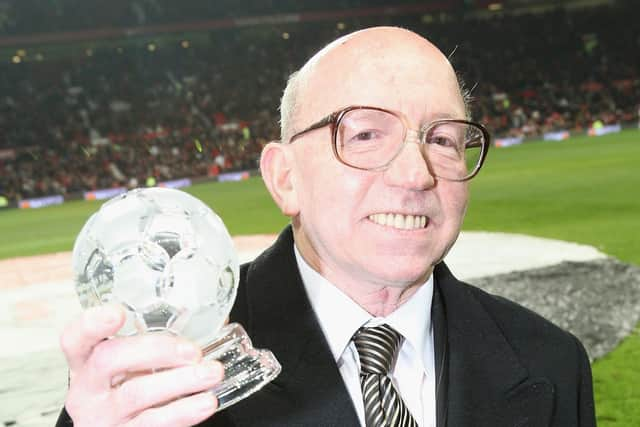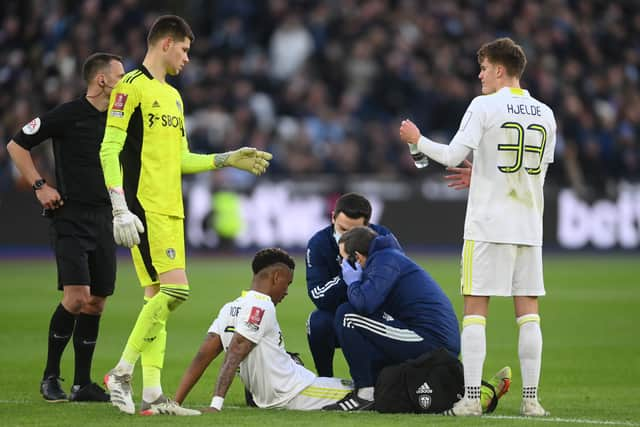Dementia in football: Nobby Stiles’ son urges action to educate footballers over heading fears
Stiles wrote to all 92 league clubs before Christmas asking to speak to their players about the issue but says only “four or five” have replied, and none have set up meetings either in person or over Zoom.
The 57-year-old, who played for Leeds between 1984 and 1989 before joining Doncaster for three seasons, has become a vocal campaigner after his father, England World Cup winner Nobby, suffered advanced dementia for years before dying in 2020 as a result of chronic traumatic encephalopathy.
Advertisement
Hide AdAdvertisement
Hide AdIn his letter to the clubs, Stiles wrote: “I am very worried that the modern-day players are not aware of the risks they incur through heading the ball. With your permission I would like to meet with the players so as to brief them on these risks and the need for proper heading protocols so that these risks can be mitigated.”


He says he does not want to stop footballers playing the game or even heading the ball, just that he feels “duty bound” to ensure they know the risks.
“I’ve got the evidence, off Professor Willie Stewart, and I wish when I was a player I was given this information,” he said. “Every time you head the ball, you injure your brain and get microscopic damage which builds up over the years and that’s why my dad’s brain was riddled with chronic traumatic encephalopathy.
“There’s a myth going about that a concussion is when you get knocked out but every time these lads head the ball, that is a form of concussion.
Advertisement
Hide AdAdvertisement
Hide Ad“I don’t want to tell the players they can’t head the ball, I just want to give them the facts and they can make their own choices.


“Chris Sutton (another former player who campaigns on the subject after his late father Mike, who played for Norwich City and Chester City, suffered dementia) said if someone had said had told him heading the ball damaged his brain he probably still would have been a footballer but he wouldn’t have headed it as much in training and Gary Lineker said he deliberately pulled out of heading the ball in training.
“I’m duty-bound given the information I have to tell these young, innocent lads of the evidence and the risk.
“The PFA (Professional Footballers’ Association) has never done it. There hasn’t been one piece of literature given to a player that there even may be a risk.
Advertisement
Hide AdAdvertisement
Hide Ad“When you see what happened with Junior Firpo at the weekend (when the Leeds defender was involved in a collision shortly before half-time in an FA Cup tie at West Ham United) and football’s refusal to allow temporary concussion substitutes I don’t think anybody cares about this risk.
“The union won’t do it, the clubs won’t and the FA won’t do it but I will and I won’t stop. I couldn’t look myself in the mirror given the information I’ve got if I didn’t at least tell these lads of the risks.”
Leeds’s medical team checked Firpo on the field for around three minutes after he collided with Illan Meslier on Sunday and detecting no signs of concussion, cleared him to continue playing as per the protocols. More than an hour later Firpo was substituted, gesturing that he was suffering dizziness.
In December 2020, sports surgeon Bill Ribbans told The Yorkshire Post “players need to be properly assessed away from the crowd and the television cameras and they need a good 10 minutes.”
Advertisement
Hide AdAdvertisement
Hide AdFirpo has declared himself fit for Sunday’s Premier League game, also at West Ham.
The campaign for more research into links between heading footballs and brain injuries stepped up after ex-West Bromwich Albion and England striker Jeff Astle died of a degenerative brain disease in January 2002. The coroner recorded a verdict of death by industrial injury.
Nobby Stiles, who played for Middlesbrough after spending the bulk of his club career at Manchester United, was not the only member of the 1966 World Cup-winning team to suffer from dementia. Goalscorer Martin Peters, former Huddersfield Town full-back Ray Wilson and Leeds’s record appearance-maker Jack Charlton died from it, and Jack’s brother Sir Bobby is also suffering. They are just the most high-profile of many cases.
Stiles is unsure if he would have played professionally knowing what he does now.
Advertisement
Hide AdAdvertisement
Hide Ad“Everybody dreams about being a footballer but Willie Stewart has shown if you played in a certain position where you headed the ball more in training, you’re even more likely (to suffer from dementia),” he said. “I don’t know what I would have done, I just know I wouldn’t have headed the ball as much.
“Sometimes lads play head tennis after training because they’re ignorant, they haven’t been told about the risks even though the authorities have known for a long time and the young lads think they’re immortal.
“I speak to former players from all levels from international players downwards and very, very often they say they’re terrified.
“Football is the only game where your head is used to propel an object and your brain is just a piece of jelly in a hard case. It isn’t rocket science.”
The PFA were approached for comment.
Comment Guidelines
National World encourages reader discussion on our stories. User feedback, insights and back-and-forth exchanges add a rich layer of context to reporting. Please review our Community Guidelines before commenting.